In February 2004, Army Specialist Benjamin Thompson’s unit was rushed into Iraq’s Abu Ghraib prison. They were assigned to replace the unit that would soon find itself at the center of a worldwide media scandal with the release of photographs documenting the assault and sexual humiliation of prisoners under their guard. But what Thompson, who was recently given his honorable discharge, wants people to know is that the crimes exposed by the Abu Ghraib photos were not isolated incidents but symptoms of the system-wide inhumane policies of U.S. detention facilities in Iraq.
While stationed for a year at Abu Ghraib, Thompson—equipped with his Buddhist training to recognize suffering and to act with compassion—forged an unlikely friendship with a prisoner named Yunis Abbas, an Iraqi journalist who had been falsely accused of plotting to assassinate Tony Blair. A new documentary film, The Prisoner or: How I Planned to Kill Tony Blair, featuring interviews with Thompson and Abbas, recounts the untold story of prisoner abuse and neglect at Abu Ghraib. I spoke with Thompson in late March at the Tricycle office while he was in town for the New York premier of The Prisoner.
—Ian Collins, Managing Editor
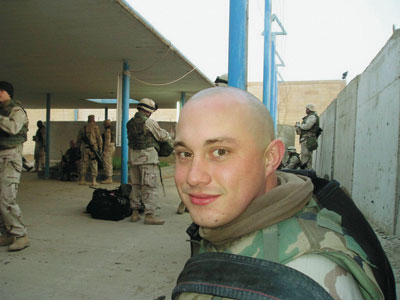
How did you first become interested in Buddhism? Before I went to Iraq, I was just kind of a book Buddhist. When I got my mobilization orders, I knew that year of my life was gone, that I wasn’t going to be in school or working or moving forward in any way. So what could I do? I could commit myself to actually exploring the spiritual path. The first person I ever told that I was a Buddhist was some Army person while I was processing onto active duty. We were going through the records review—height, weight, age, religion—and the form listed “no preference” under religion. She asked if it was still no preference, and then I said, “Well, I’m a Buddhist.”
So I got my dog tags with “Buddhist” on them and went over to Iraq. It’s an environment where suffering is very apparent. A lot of the things that the Buddha talked about are not veiled at all. I wouldn’t say my sitting practice in Iraq was very rigorous, but what I found helpful were the very basic practices: trying to be mindful in your daily life; doing basic mantras when you need to calm down or when you have a moment; trying to direct your focus in some way rather than just spacing out; and learning to actively experience compassion—not just feel sorry for somebody, but actively feel their suffering, recognize and verify it. It was just a completely transformative experience, and about a month after I got home from Iraq, I sat my first retreat at Insight Meditation Society in Barre, Massachusetts. It was a massively healing experience, and I went back again last summer. I’ve also become active in the Buddhist community in Columbus. Buddhism has become a real support in my life, and I view it as a powerful force.
What were the circumstances for your unit’s deployment at Abu Ghraib? When we were mobilized, it was with a quickness. The story hadn’t broken yet, but the military was aware of the scandal and was pretty sure that it was going to become a media issue. Other units trained for over two months before going to Iraq, but we were sent out in just over three weeks. When we got to Abu Ghraib, we spent twelve hours training with the off-going shift, and then they were done. They wanted them out right away.
What did your unit know of the impending scandal? We knew that people were being relieved of duty, that people were being charged with crimes, and that we were supposed to be the unit that was solving this problem. We didn’t know about the pictures. We got there in February, and the pictures didn’t come out until the middle of March. That’s when we found out what happened there, like everyone else.
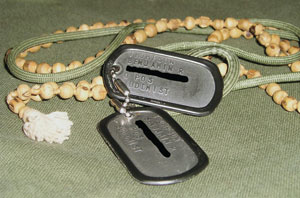
You were assigned to a section of Abu Ghraib known as Camp Ganci. Can you break down the basic organization of the prison? There were three sections to the prison. Camp Ganci was the lowest security level, and it held the vast majority of the prisoners. They were deemed to be potential security threats but to have no intelligence value. There was another section that was kind of like an in-between area—higher security, more aggressive interrogation. And then there was the “hard site,” which was indoors, in cell blocks. The hard site was what you saw in the Abu Ghraib photos.
What were the conditions at Camp Ganci when you arrived? Camp Ganci was actually eight open-air enclosures fenced in with razor wire. Each enclosure was maybe 150 meters square. There were canvas tents pitched on the dirt and port-a-johns for bathrooms. Prisoners were given unclean water and unsanitary food—food that was spoiled rotten, often with rat feces in it. There was a near-total lack of medical care and no security despite the fact that this prison was very vulnerable to attacks. Mortars would land inside the prison where these people lived. During my time there, these enclosures were massively overcrowded, each holding up to seven hundred individuals. There was about a 100-to-1 ratio of prisoner to guard, so the guards were basically there as a threat of violence. It was basically: We have guns, you don’t, and this is how it’s going to go down if you do something wrong.
Were these conditions surprising to you? Was this normal? I was trained to operate in a much more controlled environment. There’s a basic assumption that when you’re running a detention operation you won’t be attacked. There are requirements in our laws—in the Geneva Convention and the Law of Land Warfare—that you must maintain the health, welfare, and living conditions of the detainees at least at the level of the guard force that monitors them. Instead, we had these detainees drinking dirty water that’s giving them kidney stones while the guards were only allowed to drink bottled water shipped up from Kuwait. Living in open-air enclosures, the detainees were subject to attack while we were required to wear body armor and had bunkers to go to. The fact is, these people were considered less human than we were. They weren’t getting any of the consideration that they were due.
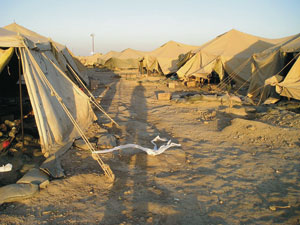
And your unit was there to help improve the living conditions and operations at Abu Ghraib? We knew that there had been problems and that our role was to correct that. Also, the unit we relieved, not to give them a pass, but they had a very difficult tour. We were new and we had our minds about us, so there was an understanding that things were going to be different when we took over. We didn’t do everything perfect, but as the year went on we did what we could to change conditions and to be more humane. Abu Ghraib really did change under our command.
Specifically, what kinds of policy and protocol changes did you implement? Well, first off we brought it out of chaos. When we got there, there were no operating procedures; each area was run however the guards for that area saw fit. Our unit brought order to the place. I can’t speak for the other camps, but in Ganci 6, our interest was negotiating with these people and trying to find a way where we could live in some kind of peace. It was very difficult to find those avenues, but fortunately there were people inside the camps who were like-minded and willing to come forward and recognize that none of us were in control and that we could work together to try to make this not so bad.
So the first step was basic communication between the detainees and the guards. I think it’s important that no matter what situation you’re in, you can find some level of connection with anybody. You can still look them in the eyes. You can still recognize their humanity and see that they want to get through this just like you do.
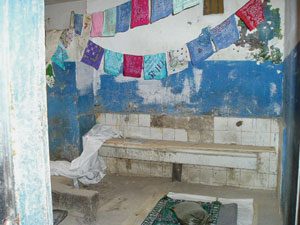
What was your motivation for helping these people? Well, I was a Buddhist when I went there and obviously that affected the way I approached the situation. But also just as a human, when you see people living in these conditions and you recognize how truly pathetic their existence is, you need to have sympathy because it’s so obvious. You just look at them and it’s written on their faces. And then when you go through certain extreme events together like experiencing massive casualties, huge triages, and lot of deaths, you recognize that we all bleed the same, that we’re all human. At that point, the veil is gone. You can’t make the division really mean anything anymore.
You became friends with Yunis Abbas, the imprisoned Iraqi journalist featured in The Prisoner. How did you come to meet him? He was an English speaker and a charismatic person who came to the front, basically, ready to help his camp out. He wanted to work to make sure things could be copasetic.
Was it your assigned duty to be in communication with certain prisoners, or was that something that was standard for all the guards? Well, our duty was opening and closing the gate—just keeping them inside, serving food, and being there when people had to be brought out—that’s really about it. The rest of it, how you handle it, how you control it, that’s up to you. To a certain degree the amount of interaction that I had with the detainees was probably not advisable, but you know sometimes what is right isn’t right. Sometimes the rules don’t actually get the job done.
You also appear in The Prisoner. How did you become involved with the film project? The director, Michael Tucker, had made a documentary about an Army unit in Baghdad called Gunner Palace. There’s a scene in Gunner Palace where they raid a house, and it turned out to be Yunis’s house. He and his family were being arrested on some supposed intelligence that they were plotting to assassinate Tony Blair. People get wrapped up in this stuff all the time. The film shows Yunis confronting the camera. He said, “I’m a journalist. There must be some mistake. What’s going on here?” An American journalist who had worked with Yunis saw the film, recognized him, and was able to reunite Tucker and Yunis in Baghdad for this second film, The Prisoner.
Then that same kind of serendipity occurred again after Tucker had finished that film, and was going to screen it in Toronto. I’d been keeping my eye out for Yunis, because we both understood that everything in the camp was wrong and we had discussed doing something about it. And then all of a sudden a review from some movie blog came up on Google about this movie Prisoner that was coming out, and it had Yunis’s name on it. I was able to get in touch with Tucker and that’s how I was brought into the film.
And they cut a longer version with your interviews, correct? Right. After Toronto we filmed over a weekend in Columbus, and that’s the version that’s opening now.
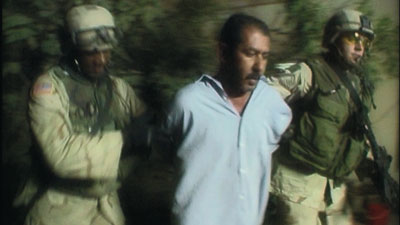
Are you proud of the film? Does it accomplish what you had hoped? Yeah, it’s a real privilege to be involved with it, because it’s allowing these things to be heard. What went on there was terrible on its own. What made it truly horrible was that nobody knew or cared about it—that these things were able to happen at a U.S. prison that’s heavily scrutinized. The huge scandal actually became a smoke screen for the further humanitarian crisis there. As long as we didn’t repeat those events, as long as pictures like those didn’t come out of there again, we were fine in the public eye. So to be able to break through that and draw attention to these problems with U.S. detention practices takes a lot of the burden off my conscience. It allows me to rest with this, finally.
How did your Buddhist training affect how you approached your duties in Iraq?Mindfulness, when applied to anything, makes it better. Even in terrible situations when you’d think it might feel better to not know or feel what’s going on, what you actually find when you delve into these experiences is that there’s wisdom there. I was able to tell myself that if this must happen, at least I can learn from it. If these people are suffering, at least I can recognize it and provide some dignity. And I think this allowed me to carry myself in such a way that I was approachable. I think it allowed me to be the person for them that they needed to see, someone who had a heart and compassionate eyes. I think in an environment that’s so dehumanizing and insulting to who they are as people, just to have that one person who cared was important. And I wasn’t the only decent human being there, but I really found that my practice helped me to be who I needed to be.
I think some people might assume that there’d be a psychological boundary that exists between prisoners and their captors. Why do you think you experienced that connection with Yunis and some of the prisoners, as opposed to cutting yourself off? Was it a choice? I think it was a choice, a choice that you make every day. When I talk to people about my experiences, they always say that it must have been so terrible and hard. But what I’ve found is that it’s just as hard to be here. It really is just as hard to be whoever you are in your daily life. And I’m not talking about terrifying existential dilemmas. If you’re mindful and present in the moment, you can notice what is right and what is wrong, what is skillful and what is unskillful; you can be there and make that decision whether you’re walking a fence in Iraq or you’re sitting on a bus going to work. It’s the same decision making process. You’re a being in the world, and you have to navigate that.
What do you hope others will learn from your story? There’s the obvious: What went on there was wrong, and we need to know about it. That’s very important to me. The whole world was blown away by the scandal, and there’s the absurdity that it was actually just concealing things that were, in my opinion, much worse. The abuse scandal was an acute situation—I don’t want to minimize it, but it was a certain thing that happened in a certain place. The things that were happening at Abu Ghraib were systemic. They were long-lasting policy decisions. It wasn’t an occurrence that happened one night on a midnight shift. It was the way that business was run there. I think that this war has become very racialized, and that there’s a lot of difficulty connecting with the Iraqi people. When you hear about one American soldier dying, how do you react? And when you hear about one hundred Iraqis dying, do you feel even as much as you felt for that one soldier? I think really, in this country, the answer is no. I think that we have discounted the humanity of the Iraqi people. I would hope that people see that no matter what the situation, it’s really important to recognize that we are all humans. We’re all here together. You have one life, one chance at this. You can do the right thing or you can do the wrong thing.
Thank you for subscribing to Tricycle! As a nonprofit, we depend on readers like you to keep Buddhist teachings and practices widely available.